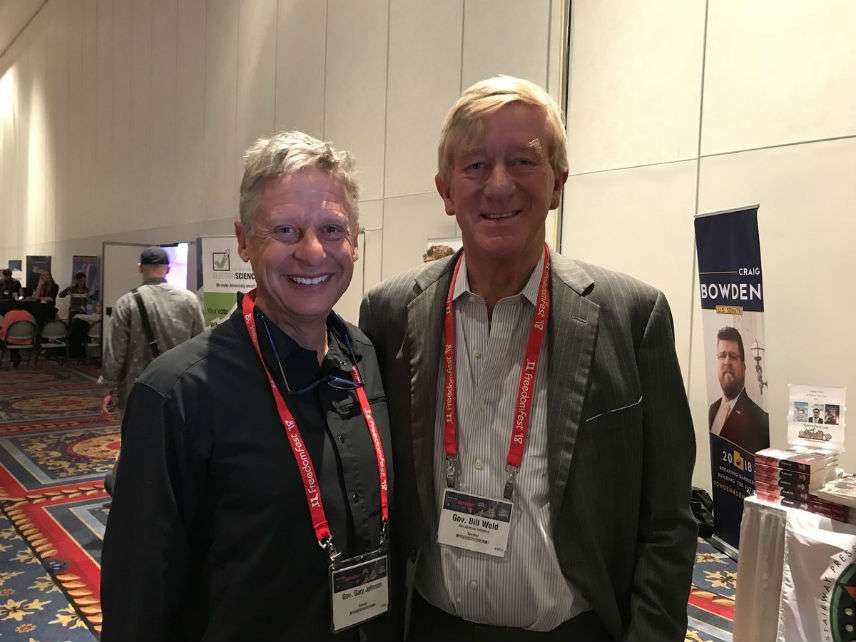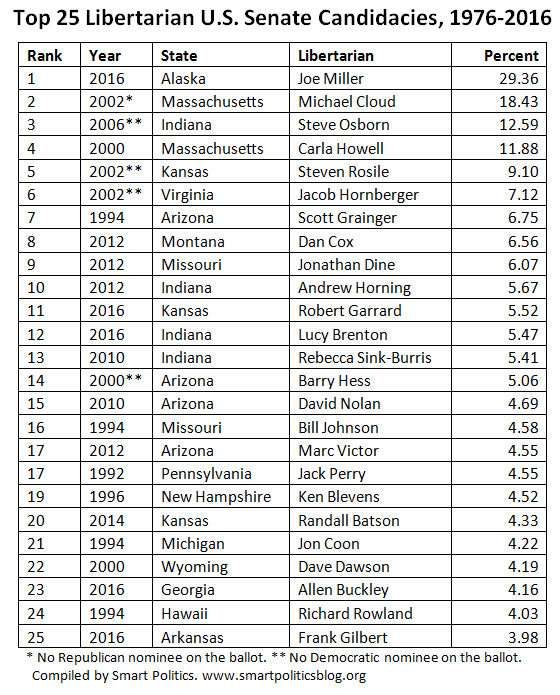Path Cleared for Still-Undecided Gary Johnson's Potentially Historic Senate Bid
Aubrey Dunn, the highest-ranking Libertarian elected official in the country, drops out of the New Mexico Senate race to make way for a two-time governor/presidential candidate who five months ago said he was "done with elected political office."

New Mexico State Land Commissioner Aubrey Dunn, the first-ever Libertarian to hold statewide office in a position determined by partisan election, has officially announced his anticipated withdrawal from the U.S. Senate race in New Mexico, clearing the path for two-time former governor and presidential third-place finisher Gary Johnson.
"He seems sincerely grateful that I'm offering him this opportunity. I believe he'll accept it," Dunn tells Reason. "With Gary taking this race over, I think this is the best thing that could happen to the Libertarian Party of New Mexico. I think that it's going to cause an unbelievable shift in the way that people look at the Libertarian Party."
Johnson, who received 9.3 percent and 3.6 percent of the presidential vote in New Mexico in 2016 and 2012, respectively (both results constituting 50-state highs, tripling his nationwide percentages), is still just "strongly considering" a run, even with the general election only three months away.
"He's not going into the race unless he thinks he can win," two-time Johnson campaign manager Ron Nielson has been telling reporters. (A year ago, Nielson's line was that there's "no doubt that Gary would be a fantastic senator. He would do an amazing job and be great at that task.")
Until very recently, Johnson was adamant about never running for office again after the miserable last two months of the 2016 presidential campaign, during which he was battered by negative advertising from Democratic billionaire Tom Steyer, hobbled by his own serial verbal gaffes, and blindsided by Hillary Clinton–burnishing statements from his own running mate.
When I asked the L.P. presidential candidate on Election Day 2016 whether we'd ever see a Johnson-for-Senate campaign, his answer was an emphatic and repeated "No!" When Nick Gillespie asked him just five months ago whether he was considering getting back into the political fray, the conversation went like this:
Johnson: No. No.
Gillespie: Absolutely not?
Johnson: No. I'm done. I'm done with elected political office.
So what changed? Polling. In late June, amid the New Mexico L.P. bungling its way through getting candidates qualified for the November election despite the party's freshly minted ballot access, Dunn, who had switched from Republican to Libertarian in January and announced his Senate bid 10 days later, decided to compare his name with Johnson's in a three-way poll against Democratic incumbent Martin Heinrich and Republican nominee Mick Rich.
"His poll numbers were three to four times better than what mine were," Dunn recalled. "He was in the high twenties, and I was in the sevens….It was pretty evident that if Gary were to take on this opportunity…he has a real chance to win."
Dunn's pollster was none other than Ron Nielson. One thing led to another—including this awkward video interview Nielson conducted with his old pal two weeks later at FreedomFest—and now the L.P. has arguably its most promising senatorial candidate in its 47-year history.
But that doesn't mean it will be easy, even if Johnson were as enthusiastic about campaigning as he is about participating in absurdly strenuous cycling competitions. The Senate race in this solidly blue state had been universally forecast until now as "Safe D." Registered Democrats in New Mexico outnumber Republicans, unaffiliateds and Libertarians by a ratio of 46 to 28 to 24 to 1. Combine that with anti–Donald Trump animus in a midterm year, and the path looks rockier than the Continental Divide.
Unless, that is, the Republican drops out.
Mick Rich, an entrepreneur turned political novice described by Santa Few New Mexican columnist Milan Simonich as a "tomato can" (Simonich argued that the GOP instead "should have sweet-talked former Gov. Gary Johnson into leaving the Siberia of the Libertarian Party to become a Republican again"), was already in pretty miserable shape before the Johnson chatter began. As of mid-May, Rich trailed Heinrich in available campaign funds, $166,000 to $3.993 million, with Dunn limping along at $7,000. A Johnson entry, speculated NM Politico's Dax Contreras Sunday, would make it "practically impossible for Mick Rich to pull off an upset."
The Rich campaign as of Sunday evening had not been quoted on the record about the Libertarian Party intrigue. (I've got a phone call in.) The New Mexican has reported without further detail that "Rich's campaign said the Albuquerque contractor is not dropping out."
Dunn for one is bullish on Johnson's chances even in a three-way race. "I think he has an opportunity to win whether the Republican stays in or out," he said. "He wins either way….One thing with Gary in the race—it's going to dry up any of the Republicans' ability to raise any funds."
There is some softness to the incumbent's obvious advantages. Heinrich, then a congressman, won his first Senate race by just six percentage points in 2012, a year Barack Obama won the state by 10. He has not exactly been cutting a broad swath since—a full 25 percent of New Mexico voters have no opinion of their junior senator, according to Morning Consult's latest data, and among the rest he has a modest 43 percent–32 percent favorable-unfavorable advantage.

A Johnson win, however far-fetched, would reshape the long-term trajectory of the Libertarian Party, and perhaps some short-term fortunes on Capitol Hill as well. Republicans now essentially control the Senate 51-49 (two of the Senators who caucus with Democrats are independents), and though there have been some indications that 2018 will be a "wave" election for Team Blue, the Senate math is brutal: As Wikipedia succinctly states, "Democrats are defending ten seats in states won by Donald Trump in the 2016 presidential election, while Republicans are only defending one seat in a state won by Hillary Clinton in 2016."
Though state polling data of even contested Senate races can be shockingly sparse, and polls for the World's Greatest Deliberative Body are more error-prone than presidential surveys, the very preliminary consensus among forecasters is that Democrats have maybe a one in three chance of wresting control back from Republicans. Replace safe-D Heinrich with Libertarian Johnson, and those odds take a serious tumble.
If Democrats were to take a 50-49-1 post-election advantage, they'd still need to woo the Libertarian on party-line votes in order to avoid a tiebreaker from Vice President Mike Pence. Given that Johnson leans closer to Trump than Sen. Chuck Schumer (D–N.Y.) on regulation, domestic taxes, and the more dovish aspects of the administration's foreign policy, that swing vote would no doubt prove to be an irritant, despite Johnson's more copacetic views on immigration, criminal justice, and social issues.
For the L.P., having a first elected federal official would be a watershed event, replacing overnight nearly five decades of conjecture with the concrete. Elected Libertarians such as Nebraska State Sen. Laura Ebke (a party-switcher) and Calimesa Mayor and Riverside County Board of Supervisors candidate Jeff Hewitt (technically a nonpartisan, though his affiliation is nobody's secret) are already demonstrating that Libertarians as legislative swing voters can accomplish real policy victories on the state and local level. A federal Leviathan run by a mercantilist who is bringing back the bad old days of $1 trillion annual deficits is more than ripe for libertarian-flavored reform.
Until now, the best performance among the more than 330 Libertarian Senate candidates since 1976 has been Alaska's Joe Miller, who finished second in a four-way race with 29 percent of the vote in 2016. Miller, a former Tea Party Republican, endorsed Donald Trump instead of Gary Johnson that year; also, Libertarian vice-presidential nominee Bill Weld endorsed Miller's victorious opponent, incumbent Lisa Murkowski.
The next-best L.P. Senate performances, according to a very useful Smart Politics article and chart by Eric Ostermeier, were Michael Cloud's 18.4 percent in Massachusetts (2002), Steve Osborn's 12.6 percent in Indiana (2006), and Carla Howell's 11.9 percent in Massachusetts (2000). No other Libertarian has cracked double digits.
But breaking the previous L.P. record for a Senate race while still finishing second would represent a net loss in the party's number of elected officials. That's because Aubrey Dunn will no longer be state land commissioner of New Mexico in 2019, and the chances of L.P. nominee Michael Lucero beating Republican Patrick Lyons for the office are remote indeed. "We polled [the race] a year ago," says Dunn, who has been engaged in a series of political skirmishes with the GOP, "and I didn't poll well."
